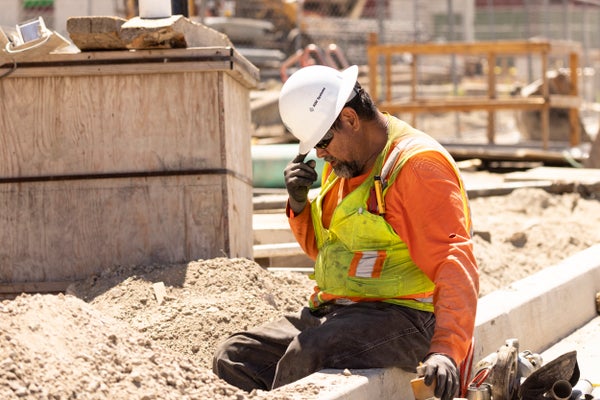Trumps Election Threatens Heat Protections for Workers
November 11, 20243 min readWorker Protections for Extreme Heat in Peril after Trumps ElectionA Biden administration proposal that would require employers toprovide cooling measures under extreme heat conditions may be scuttled by the incoming Trump administrationBy Ariel Wittenberg & E&E NewsA worker adjusts his helmet on a construction site in Los Angeles during a heatwave in July 2024. Etienne Laurent/AFP via Getty ImagesCLIMATEWIRE | The return of former President Donald Trump to the White House puts at risk new heat protections for workers that were proposed over the summer by the Biden administration, say workplace advocates.Trump on the campaign trail never directly addressed the proposal from the Occupational Safety and Health Administration, which would force employers to provide their workers with water and cool places to rest when temperatures are high.But many of Trumps Republican allies in Congress panned the idea when it was announced, including House Natural Resources Chair Bruce Westerman (R-Ark.). Westerman called it one of the most idiotic things theyve ever done and said the heat protection rules ignored the realities of outdoor work.On supporting science journalismIf you're enjoying this article, consider supporting our award-winning journalism by subscribing. By purchasing a subscription you are helping to ensure the future of impactful stories about the discoveries and ideas shaping our world today.During Trumps first term, OSHA stopped work on many health regulations, including one slated to be proposed in October 2017 that would have forced the healthcare industry to prepare for an airborne pandemic such as COVID-19.Outright killing the heat protection proposal, however, would be difficult for the incoming Trump administration because of the laws governing the way OSHA issues public health standards, said Jordan Barab, who was OSHAs deputy assistant secretary of Labor for occupational safety and health during the Obama administration.But Barab said theres nothing that requires the next administration to finalize the rule which could put peoples lives in danger.If the Trump administration does not move forward, people will die, Barab said. I dont think theres any doubt about that.Heat killed at least 815 workers between 1992 and 2017 and seriously injured some 70,000 more, according to federal data. And health advocates say the toll is likely to increase as temperatures rise with global warming.OSHA has been under pressure to protect workers from heat for decades, starting with a 1986 report from the Centers for Disease Control and Prevention recommending heat standards.More recently, congressional Democrats put pressure on the agency at the end of the Trump administration with a bill co-sponsored by now-Vice President Kamala Harris that would have required the agency to issue a rule.But it was only this past summer that OSHA finally proposed the regulation which, if finalized, could protect some 35 million workers from extreme heat.Groups representing some of those workers now fear it wont be enacted.President Trump would have to actively work to undo that progress intentionally putting workers including many who no doubt voted for him in harms way, said Antonio De Loera-Brust, a spokesperson for the United Farm Workers. Whether these workers are killed by extreme heat on the job should not be a partisan issue.In the absence of federal action, workers and their advocates would have to lobby the 29 states that enforce worker safety rules to enact their own heat protections, Barab said.He added that state action could create a situation similar to the history of the right to know rule, which requires employers to inform workers about the hazardous properties of the chemicals they work with. In 1981, the Reagan administration froze work on such regulations that began under President Jimmy Carter.After labor advocates successfully convinced some 15 states to adopt their own rules over two years, OSHA was forced to publish its own right to know rule to standardize requirements across jurisdictions in 1983.Six states currently have heat protections for workers, but others are resistant to the idea. Texas and Florida recently passed laws blocking municipalities from requiring water and rest breaks for workers.One state that has moved forward with greater protections is Maryland, which enacted its heat standards in September spurred in part by the heat stroke death of a Baltimore sanitation worker.If theres any silver lining, its that there is no doubt that climate change is a problem, and that it is likely to be a record hot spring and summer again. These rising temperatures are not easy to hide, nor are the inevitable workplace deaths, Barab said. So its possible there will be some pressure to do something at the state and federal level.Reprinted from E&E News with permission from POLITICO, LLC. Copyright 2024. E&E News provides essential news for energy and environment professionals.


